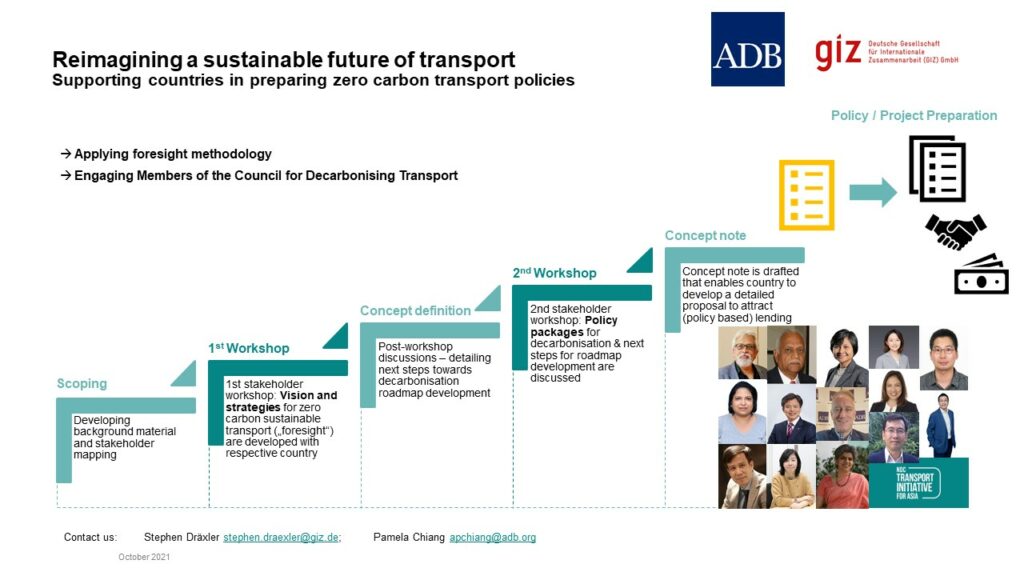
I personally have the vision that the children of today will take their own children to the museum in 2050 and show them how an internal combustion engine looked like, because there will not be any on the streets anymore. They will be amazed by the noise and dirt that comes out and wonder how anyone could have allowed anything like it on the streets.
Dr. Yossapong Laoonual, Member of the Council for Decarbonising Transport in Asia; Honorable Chairman of Electric Vehicle Association Thailand
As member of the Council for Decarbonising Transport in Asia, Dr. Yossapong Laonnual is working with 13 other transport experts and professionals to share their vision of an effective, efficient and socially just zero carbon transport in 2050. He underlines that the Council’s vision is not only an environmental and social requirement, but also an economic necessity. Asia is amongst the countries most affected by the impacts of climate change. Investments in transport need to be future proof – enduring emission reductions and being resilient to the impacts of climate change.
The event “Decarbonising Asia’s Transport Sector: How to Deliver on Proposed Goal 1a of the Aichi 2030 Declaration” took place one week before the 14th High-Level Regional Environmentally Sustainable Transport Forum (EST). At the forum, member countries are invited to adopt the 2030 Aichi Declaration, agreeing on new climate and sustainable development goals for the transport sector in the region.
“EST Member countries have the power to change – governments can set a clear and reliable framework for private and social innovation, provide investment security with a clear vision and co-develop strategies with other relevant stakeholders”, asserts Dr. Yossapong Laoonual.
The proposed Aichi Declaration could therefore strengthen the decarbonisation efforts in the region, up to 2030 but with a view to decarbonisation in 2050.
“The updated EST Declaration could not come at a timelier moment. The actions taken in the next 10 years will decide whether we will be able to limit global warming to below 2 degrees Celsius or not.”
Urda Eichhorst, Project Director NDC Transport Initiative for Asia (NDC TIA)
Introduced by a presentation of SLOCAT, the NDC TIA partner countries – China, India and Vietnam – discussed in breakout groups how they are already moving towards action:
Living in a so-called VUCA world (volatile, uncertain, complex and ambiguous) it is important to systematically analyse the future. In order to inform today’s decisions, we need long-term thinking for a future-ready transport system. Pamela Chiang, Senior Transport Specialst (ADB), presented how the foresight methodology can be used to develo a country-specific vision for the future of sustainable mobility as a springboard for implementation. (More information)
“To achieve the overarching goal of tackling climate change, we need to facilitate a comprehensive transformation in the transport system by moving from single infrastructure investments to policy-based lending.”
Jamie Leather, Chief of Transport Sector Group (ADB)
GIZ and ADB have agreed to jointly apply this foresight methodology to support further countries in Southeast Asia to develop their own roadmaps for transforming transport. Aim of the cooperation is to enable countries to attract policy loans and/or other climate finance. Members of the Council for Decarbonising Transport in Asia will support the country dialogues. (More information)

The event was organised in cooperation with the United Nations Centre for Regional Development (UNCRD), the Asian Development Bank (ADB), Deutsche Gesellschaft für Internationale Zusammenarbeit (GIZ) and the SLOCAT Partnership on Sustainable Low Carbon Transport as part of the NDC Transport Initiative for Asia (NDC TIA), funded by the German Federal Ministry for the Environment, Nature Conservation, Building and Nuclear Safety’s (BMU) International Climate Initiative (IKI).
